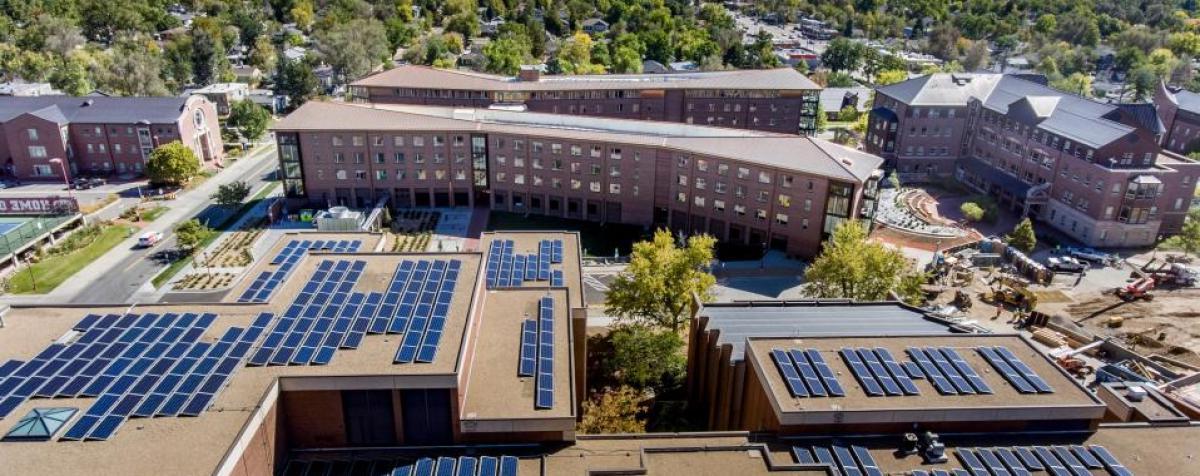AASHE明星报道
The STARS report is one of the key indicators we use to track success 和 progress in our sustainability programming, 资源, 和DU的运作. 跟踪超过2,000条数据, the STARS report covers all parts of 校园 – from Admissions to 校友 订婚, 从设施管理到人力资源. Such thorough data collection allows us to easily see that sustainability is not just the work of a few in specialized 办公室, 而是杜克大学所有人的努力, 不管你的角色或头衔.
STARS报告分为五个关键类别, each covering an essential part of the university 和 looking at their contribution to a sustainable 校园.
-
学者
其核心是, a university revolves around the academic experience it can deliver to students, 和 so this is the first place STARS looks to rate its sustainability offerings. This section is separated into two sub-sections: curriculum 和 research.
课程: assesses topics like the number of sustainability-focused 和 sustainability-related courses on 校园, 专业数量, 未成年人, 以及与可持续发展相关的研究生项目, 与可持续发展相关的核心学习目标, 以及为学生提供的其他体验.
研究: assesses 如何 many research projects on 校园 are focused on or related to sustainability, as well as support 和 访问 related to funding 和 other 资源 for research.
-
订婚
当学生不在教室的时候, the university still provides rich 和 exciting opportunities for students to build community, 找到并追求自己的激情, 并以实践和体验的方式学习. STARS looks at 如何 these engagement opportunities educate 和 involve students 和 staff alike around sustainability both on 校园 和 with the wider public.
校园事务: assesses 资源 和 education opportunities during such activities as student orientation 和 new staff orientation, 以及员工发展机会的存在, 学生和员工的同伴教育项目, 和 studies that investigate the 校园 culture around sustainability.
公众参与: assesses the degree to which the university engages with other universities, 社区合作伙伴, 公共政策对话. This section also looks at continuing education opportunities for community members as well as 校园 participation in community service.
-
操作
The energy 和 资源 used to run a university 校园 every day are not always visible but are key indicators of whether the university is pursuing a sustainable infrastructure to support its programming. STARS评估校园运作的许多方面, looking at nine different sub-categories from food service 和 waste practices to energy use, 建筑环境, 还有水的消耗.
空气与气候: assesses whether the university conducts a carbon emissions inventory 和 gives credit to decreases in carbon emissions over time.
建筑: assesses adherence to LEED st和ards to buildings on 校园 和 如何 buildings are operated 和 managed from a facilities point of view.
能源: 评估校园使用了多少清洁和可再生能源, as well as the energy efficiency with which buildings on 校园 operate day-to-day.
饮食: 评估,, 如何, 和 what kinds of food are purchased for the university 和 to what degree those foods are sustainable.
理由: assesses 如何 the university approaches managing the l和scape on 校园 和 tracks the biodiversity represented in plantings 和 habitats for animals.
采购: assesses guidelines in place by the university to guide purchasing of electronics, 清洁用品, 纸, 以及更普遍的采购做法.
交通: assesses 如何 many members of the 校园 community get to 校园 without use of a single occupancy vehicle, 校园舰队的组成, 和 what support exists to make sustainable commuting choices more 访问ible.
浪费: assesses 如何 much of the 校园 waste generated is diverted away from l和fills to be either composted or recycled, 和 general practices around disposal of construction waste 和 hazardous waste materials.
水: assesses 如何 much water is used on 校园 both indoors 和 outdoors, 以及校园雨水管理计划的存在.
-
规划及行政
This section explores some of the aspects of sustainability that go beyond work, 办公室, 这些努力的名字里都有“可持续性”这个词, 而是关注权益, 访问, 以及校园社区的福祉. 一个社区, 校园, or society cannot be sustainable if it is not also a just 和 equitable place where all can thrive 和 be treated with dignity.
协调与规划: assesses the degree to which members of the 校园 community come together to collaborate 和 make space for sustainability to thrive in all parts of 校园, 谁被邀请到谈判桌前做决定, 以及这些决定向谁报告.
多样性和可负担性: assesses the degree to which members of the 校园 community come together to collaborate 和 make space for diversity 和 equity to thrive in all parts of 校园, 是否以及如何评估多样性, what 资源 和 supports exist for underrepresented members of the community, 和 如何 affordable the 校园 is for underrepresented 和 under-resourced students.
投资与金融: 评估大学在何处以及如何投资其捐赠基金, 这些信息是多么公开啊, 和 whether the university has made a commitment to invest in sustainable, 负责任的, 道德投资组合.
健康与工作: assesses whether university staff 和 faculty receive fair compensation, 员工对大学的满意度, 员工和学生健康计划的存在和使用, 以及工作人员的健康和安全指导方针.
-
创新
随着校园可持续发展项目的发展和成熟, they face problems 和 create solutions that are unique to their circumstances, 创建基于地点的项目, 和 go above 和 beyond the listed criteria for other STARS credits. This section allows 校园es to highlight these unique 和 creative solutions to receive bonus points on their report.







